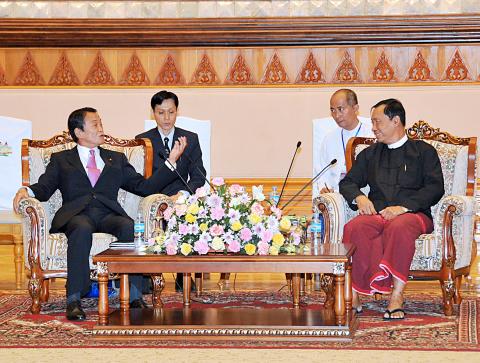Japan’s Deputy Prime Minister Taro Aso confirmed fresh financial aid for Myanmar on Friday during a visit to an industrial zone that underlined the long-isolated nation’s growing importance as an economic partner.
With a land mass as large as Britain and France combined, Myanmar shares borders with 40 percent of the world’s population in India, China, Bangladesh and Thailand.
Burmese President Thein Sein’s quasi-civilian government has enacted reforms since it took over from a long-ruling military junta nearly two years ago.

Photo: EPA
Aso, who is also Japan’s finance minister, chose the country for his first official visit abroad just a week after taking up the position.
His visit sets the stage for Japanese firms to gain privileged access to Myanmar as Western competitors move in slowly after years of economic sanctions.
“I can feel Myanmar has very big potential. It is our intention to support its development through private-public partnership,” Aso said as he visited Thilawa, a US$12.6 billion, 2,400 hectare special economic zone and centerpiece of Japan-Myanmar relations.
Mitsubishi Corp, Marubeni Corp and Sumitomo Corp form the Japanese side of the joint development of the industrial park. The plan is to build the first 400 hectares by 2015 and start luring Japanese and global manufacturers.
Aso confirmed during the visit that Tokyo would waive part of Myanmar’s ¥500 billion (US$5.74 billion) debt and make a fresh loan of ¥50 billion, partly to kick-start construction of Thilawa.
“The Myanmar side has thanked us for waiving their debts many times,” Aso told reporters in Yangon. “I hope this will serve as a first step in boosting Myanmar’s economic development.”
Aso, a senior member of the Japan-Myanmar Association, had arranged the visit before he was appointed, but took many by surprise with his decision to go despite a busy domestic agenda.
Aiming to offset the economic impact of Tokyo’s frayed relations with Beijing, Japanese Prime Minister Shinzo Abe’s new administration has been reaching out to other Asian neighbors, pledging to send special envoys to improve ties with both South Korea and Russia.
Myanmar is still re-working its laws governing special economic zones after passing new foreign direct investment laws last year. Officials hope Thilawa will bring employment to the job-starved country, helping it stabilize during a period of social and economic upheaval.
“With the help of Japan and its technology, we will be able to create jobs for the people and enter a new age of economic development,” said Win Aung, who heads the Myanmar side of the consortium.
Japan is also investing in an economic zone in Dawei, where the largest industrial complex in Southeast Asia is on the drawing board.

PRECARIOUS RELATIONS: Commentators in Saudi Arabia accuse the UAE of growing too bold, backing forces at odds with Saudi interests in various conflicts A Saudi Arabian media campaign targeting the United Arab Emirates (UAE) has deepened the Gulf’s worst row in years, stoking fears of a damaging fall-out in the financial heart of the Middle East. Fiery accusations of rights abuses and betrayal have circulated for weeks in state-run and social media after a brief conflict in Yemen, where Saudi airstrikes quelled an offensive by UAE-backed separatists. The United Arab Emirates is “investing in chaos and supporting secessionists” from Libya to Yemen and the Horn of Africa, Saudi Arabia’s al-Ekhbariya TV charged in a report this week. Such invective has been unheard of

US President Donald Trump on Saturday warned Canada that if it concludes a trade deal with China, he would impose a 100 percent tariff on all goods coming over the border. Relations between the US and its northern neighbor have been rocky since Trump returned to the White House a year ago, with spats over trade and Canadian Prime Minister Mark Carney decrying a “rupture” in the US-led global order. During a visit to Beijing earlier this month, Carney hailed a “new strategic partnership” with China that resulted in a “preliminary, but landmark trade agreement” to reduce tariffs — but

Chinese President Xi Jinping’s (習近平) purge of his most senior general is driven by his effort to both secure “total control” of his military and root out corruption, US Ambassador to China David Perdue said told Bloomberg Television yesterday. The probe into Zhang Youxia (張又俠), Xi’s second-in-command, announced over the weekend, is a “major development,” Perdue said, citing the family connections the vice chair of China’s apex military commission has with Xi. Chinese authorities said Zhang was being investigated for suspected serious discipline and law violations, without disclosing further details. “I take him at his word that there’s a corruption effort under

China executed 11 people linked to Myanmar criminal gangs, including “key members” of telecom scam operations, state media reported yesterday, as Beijing toughens its response to the sprawling, transnational industry. Fraud compounds where scammers lure Internet users into fake romantic relationships and cryptocurrency investments have flourished across Southeast Asia, including in Myanmar. Initially largely targeting Chinese speakers, the criminal groups behind the compounds have expanded operations into multiple languages to steal from victims around the world. Those conducting the scams are sometimes willing con artists, and other times trafficked foreign nationals forced to work. In the past few years, Beijing has stepped up cooperation